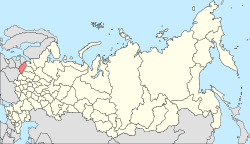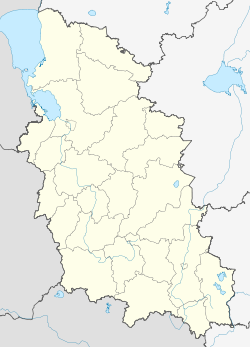Pskov
| Pskov (English) Псков (Russian) |
|
|---|---|
| - City - | |
 1st row: House of Soviets, Mirozhsky Monastery, Monument to Alexander Nevsky, 2nd row: Alexander Nevsky cathedral, Pskov State University, 3rd row: Pskov Krom, Faith, Hope, Love and Sophia church |
|
 Location of Pskov Oblast in Russia |
|
|
|
|
|
|
|
|
|
|
| City Day | July 23 |
| Administrative status (as of February 2009) | |
| Country | Russia |
| Federal subject | Pskov Oblast |
| Administratively subordinated to | City of Pskov |
| Administrative center of | Pskov Oblast,Pskovsky District, City of Pskov |
| Municipal status (as of February 2005) | |
| Urban okrug | Pskov Urban Okrug |
| Administrative center of | Pskov Urban Okrug, Pskovsky Municipal District |
| City Head | Ivan Tsetsersky |
| Representative body | City Duma |
| Statistics | |
| Population (2010 Census) | 203,279 inhabitants |
| - Rank in 2010 | 91st |
| Time zone | MSK (UTC+03:00) |
| First mentioned | 903 |
| Postal code(s) | 180xxx |
| Dialing code(s) | +7 8112 |
|
|
|
| on | |
Pskov (Russian: Псков; IPA: [pskof], ancient Russian spelling "Плѣсковъ", Pleskov) is a city and the administrative center of Pskov Oblast, Russia, located about 20 kilometers (12 mi) east from the Estonian border, on the Velikaya River. Population: 203,279 (2010 Census);202,780 (2002 Census);203,789 (1989 Census).
Pskov is one of the oldest cities in Russia. The name of the city, originally spelled "Pleskov", may be loosely translated as "[the town] of purling waters". Its earliest mention comes in 903, which records that Igor of Kiev married a local lady, St. Olga. Pskovians sometimes take this year as the city's foundation date, and in 2003 a great jubilee took place to celebrate Pskov's 1,100th anniversary.
The first prince of Pskov was Vladimir the Great's youngest son Sudislav. Once imprisoned by his brother Yaroslav, he was not released until the latter's death several decades later. In the 12th and 13th centuries, the town adhered politically to the Novgorod Republic. In 1241, it was taken by the Teutonic Knights, but Alexander Nevsky recaptured it several months later during a legendary campaign dramatized in Sergei Eisenstein's 1938 movie Alexander Nevsky.
...
Wikipedia



